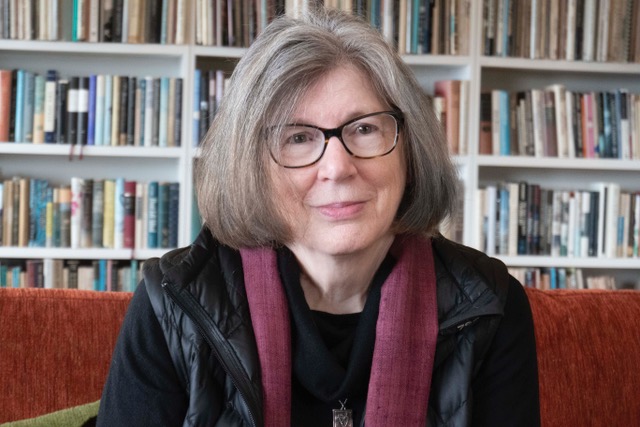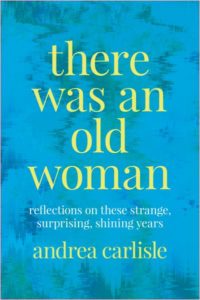
By OREGON ARTSWATCH
Andrea Carlisle’s mother, Alice, was 93 when she came to Oregon and Carlisle became her primary caregiver. Soon, Carlisle’s time with Alice and her friends inspired her to start the blog she called “Go Ask Alice … When She’s 94.”
In a short time, Carlisle’s tales attracted a sizeable following.
“A lot of people could relate,” Carlisle said. “Not just caregivers, but people who had older people in their lives and were interested in older people.”
Carlisle continued the blog for seven years, ending it 15 years ago after her mother died at age 100. Now, Oregon State University Press has published Carlisle’s book of essays on women and aging, “There Was an Old Woman: Reflections on These Strange, Surprising, Shining Years.”
The Newport Public Library will host Carlisle in an author talk via Zoom from 2-3:30 p.m. Saturday, Nov. 4. Carlisle will read briefly from the book, then open it up to a conversation with the audience.
The talk is open to the public, but pre-registration is required. For information and to register for the Zoom link, call the library at 541-265-2153 or email reference@newportlibrary.org.
Oregon ArtsWatch spoke with Carlisle, who lives in Portland and leads writing workshops and classes, about her new book. The interview has been lightly edited for length and clarity.
Can you give us a taste of what the book is about?

Carlisle: It’s an attempt to own my own later years as well as a search for the Old Woman in art, literature, and children’s books. I wanted to understand what we’ve been given to believe an old woman is. Do our own lives actually reflect what we’ve inherited about her? Or should we question how and why she’s been presented over time in a way that invites dismissal, contempt, scorn, even fear?
What did you learn in those years caring for Alice and spending time with her peers?
It really did change the way I looked at aging. The first thing I learned was that you don’t become someone else when you age. You do not enter another country. You bring yourself into these years. I became more aware that my mother was more and more herself. I was more and more myself. It’s an inner expansion. It’s not about transforming into someone else. You make sense of these years based on your entire life. Not that, “Oh, this is strange. I’m a stranger in a strange land.” It’s not that at all.
One of things you often hear from women who are aging is a sort of mourning the loss of their looks. Have you experienced that?
My mother’s looks were very important to her, of primary importance. Losing her beauty — which she never actually did, but her sense of losing her beauty — was devastating for her. She was using anti-aging cream right into her 100th year. I don’t have that relationship to my appearance. I didn’t have that sense ever that I was a knockout and men or woman fell at my feet. But I was able to observe that. I could see this was really difficult. We’re taught our looks are our currency. That doesn’t just go away — “poof” — because we are 60 or 70 or 80.
In the title essay, you write about how women have been depicted in children’s books – the old woman who lived in the shoe and spanked the kids before putting them to bed, the old woman who tried to shove Hansel and Gretel into the oven, and on and on. Are women still being portrayed that way?
I had to break what I was trying to say down into two essays. There is the title essay you’re referring to, which is kind of the key. Then, there’s another one about children’s books, and how old people are presented in children’s books.
There has been some progress. There’s a website called “A is for Aging, B is for Books” that’s run by a woman named Lindsey McDivitt, and she tries to select out of the stream of children’s books published every year the ones that address inter-generational relationships and present old people in a human way. She also points out sometimes which books do not do that. And there are a lot of them. There are children’s books that create very negative images, children’s books published in the last 20, 30 years that present the old woman as a kind of scary person. And children are little sponges, and they take that in.
One researcher interviewed very young children about growing old, and as soon as they’re 3 or 4 years old, and you ask them, “Do you ever want to be old?” They’ll say no, because the images they’ve seen are very ugly, and they’re either very feeble, weak-looking people or kind of scary or ridiculous, wacky people.
Do they portray men in the same way?
Sometimes, just not as much.
In writing these essays, what have you learned?
One thing I’ve learned is compassion toward myself and other people as we age. It isn’t easy. I’ve learned to look at things more closely, like what I was just talking about in children’s books. In literature, there’s an absence of the old woman; there’s very rarely an old woman or an older woman who is the central character in any story — unless she’s reminiscing about her past. But there are very few books of fiction with an old woman who is living her life right now with no flashback to the past. So, I’ve learned that there must be some fear around reading about old women. Also, there’s an assumption that there’s no interest in the lives of older women. And I don’t think that’s true.
What do you hope readers take away from your book?
We talked about the losses involved in old age, but not so much the gains. I’d like to add that our inner lives can become remarkably richer as we age, including an expansion of compassion, curiosity, understanding, and acceptance, including self-acceptance. To the degree that we deny our aging is the degree to which we miss out on that expansion.
One last note, at previous events, I understand there’s been lively conversation about all of this, and there will be an opportunity for the same at the Newport event. What’s that about?
People want to talk about these things. They have been waiting for someone to say some of these things out loud. I wrote these essays because I wanted to contribute to the conversation. I’m not an expert. I’m not an academic. I’m just my own self looking at these things, wondering about them, exploring what’s happening to me, what’s happening to my friends. And it turns out, a lot of women are wondering about the same things, exploring the same ideas, and they want to talk about it. And I want to continue the conversation.
- This story was originally published by our news partner Oregon ArtsWatch, which is supported in part by a grant from the Oregon Cultural Trust, investing in Oregon’s arts, humanities and heritage, and the Lincoln County Cultural Coalition. For more arts news coverage go to Oregon ArtsWatch



